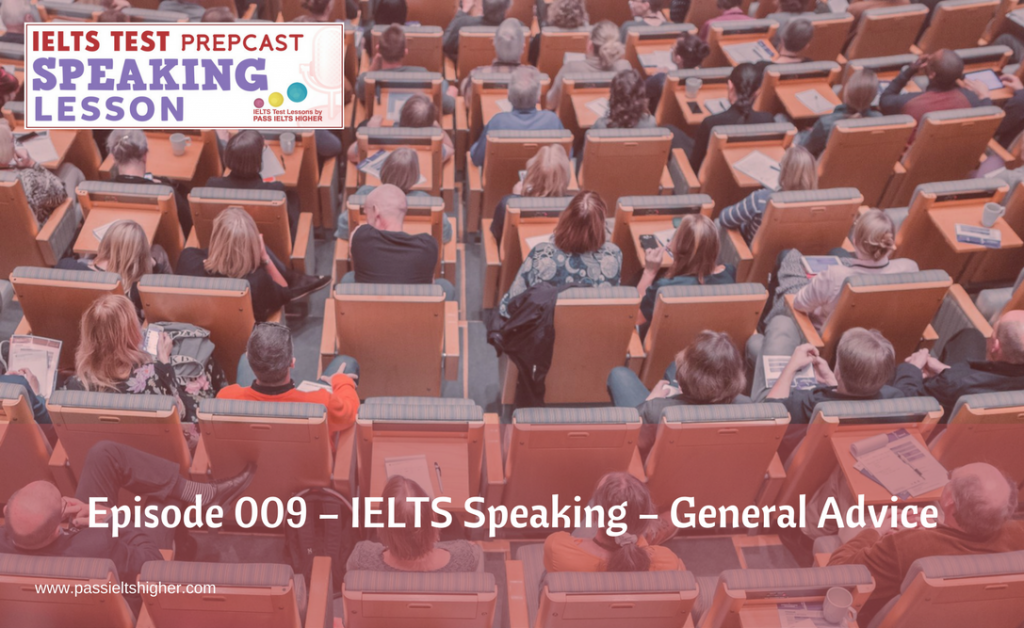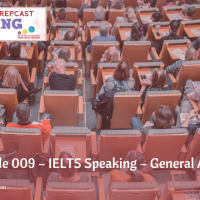

- Social:
- Link:
In this lesson Andrea provides general advice for the IELTS Speaking test.
Click here to be taken to iTunes where you can subscribe to all of the IELTS Test Prepcasts.
Podcast Transcript
IELTS Test Prepcast Episode 9
IELTS Speaking: General Advice
The IELTS Test Prepcast provides three free IELTS test lessons each week for candidates who are aiming for IELTS band scores 7, 8, or 9.
I’m Steve Price. I’m the founder of the Pass IELTS Higher website, which was started in late 2010 and has been successfully helping students achieve higher band scores since.
Andrea Price currently lives and works in London, teaching IELTS, and has previously lived in Spain. She is a qualified teacher of English as a second language and has been teaching the subject at home and abroad for over twenty years.
If you enjoy this free IELTS Test Prepcast, please show us your support and appreciation by heading over to ieltstestprepcast.com and clicking the “subscribe on iTunes” button at the top of the page. This will shoot you over to iTunes, where you can leave a rating and review.
And now for today’s IELTS lesson . . .
Steve: Today we’re going to be talking about IELTS speaking part 2. Andrea’s here with me, and she’s going to give us an overview and teach us a little bit about it.
Andrea: Hello. First, speaking part 2 is usually the section that the students get most worried about. The reason for this is that it’s really spontaneous. You might have to talk about any topic possible. Of course, there are typical topics and you can think about them a little bit, but this actually does worry the students. So some of these tips will help you calm down, I think. So the approach in speaking section 2 is that you are given a booklet with a prompt on, and the prompt outlines what you are going to talk about in your topic.
Steve: Could the topic be about anything?
Andrea: Absolutely anything, yes. There’s a box on. What they call the prompt is a box, and inside the box, there are five areas, and these five areas naturally make a presentation. Obviously, you are there to do a presentation, but the prompt helps you. There are always five parts on the prompt card, and the first line tells you what the topic is that you’ve been given, so that’s naturally the introduction to a presentation. The next part has three questions for you to answer and gives you a natural body of the presentation. The three questions are what we call wh– questions, and so we’ll ask you things like, the wh– questions, so why, where, how, when, who, what, and which. So if you are preparing at home and you give yourself a little topic, you can imagine any of those questions, and just think what the examiner might say and how you might reply. And the last line in the cue card asks you a question, and when you answer it, this will give you the natural conclusion to your presentation. So you see, it’s really guiding you to make a presentation.
Steve: Okay, so the difficulty of this and the reason that students are so nervous about it is really its spontaneity. The fact is that they could be a given a topic about anything and they would have to dredge up the vocabulary to use in the presentation and be prepared to answer the questions on the cue card.
Andrea: Yes. You’ve mentioned vocabulary, and I would just say that you shouldn’t focus too much on vocabulary. If you’ve got lots of global expressions that you can recycle in any topic you talk about, that will actually take up quite a bit of time and might lose your need for extra topic vocabulary, topic-specific vocabulary that you don’t have, so it’s possible not to worry about the vocabulary if you want to. So the examiner will give you a minute to prepare your talk, and this gives you time to plan what you’re going to include and how you are going to say it. Remember, if you use your time wisely to plan what you’re going to say, your presentation will be logical, well linked, and easy for the examiner to follow. When you achieve this, providing the other aspects are good too, you’ll be given the IELTS band score you require.
Steve: Given that cue cards are fairly logical—as you pointed out, there’s five parts on the cue card, which actually give you the running order—does that mean that your presentation is, in effect, is almost pre-planned for you? You just need to remember how to join those bits together.
Andrea: Yes, and also you obviously you’ve got to have the opinions as well, so the questions are very basic, like why, and that obviously links to the topic you’ve been given, but all this is for you talk about it from your knowledge really.
Steve: Okay.
Andrea: Yes, right. The plan. In the minute you have for planning, you can list the things you’d like to include, or you can do a mind map with the topic in the centre and ideas leading off what you’re going to do. These can include such things as, you want to be logical, so what linkers are you going to use to join your points together? As you said, Steve. What topic-specific vocabulary can you include? You also mentioned that. And then everything is under your control now, so list some of the collocations and complex examples of grammar that you can include to boost your score, and these are the global ones I told you about, all the universal expressions.
Steve: Okay. What we’ll have to do is link to that lesson as we compile the show notes for this one.
Andrea: In the actual presentation, after your minute to prepare, the examiner will give you two minutes to speak. Remember, you’re being assessed on your fluency more than anything else, so before the exam, do lots of practice of offering your thoughts with no hesitation or no need to think about what you’re going to say or no need to try to use accurate grammar. You do it in your head easily as well. If you don’t really have people to talk to, you can just plan what you’re going to say in your head, and that’s going to make you more fluent. Of course, because nobody’s correcting you, you might not be accurate, but I think you will be quite fluent if you practice that. The minute you begin to think, you will have gaps in your speaking, then you’ll not appear as fluent as you probably are, and that will lose you marks in the fluency column. Of course, you will be nervous, and it’s easy to say try to relax, but imagine you’re taking to your friendly teacher or your favourite friend, then this will help your nerves and encourage your fluency. The examiner only wants you to do your best, so don’t think he or she is your enemy.
Steve: Okay, I guess what’s interesting is that on our Pass IELTS Higher website, the two services that we offer which are most subscribed to are our speaking preparation and writing preparation. Both of them are coming out as being the elements that the students are most concerned with and which they can practice to do something about.
Andrea: So if they listen to this as well, that will help them a little them bit, won’t it?
Steve: Yes, it will.
Andrea: Yes. Okay, what I would say is be prepared. You have to speak for two minutes. If you have not mentioned the conclusion of your presentation before the examiner stops you exactly when two minutes have gone by, you will lose valuable marks. Practice speaking to yourself with a variety of the speaking topics so you get a natural feel of how long two minutes is. It’s not easy to speak for two minutes even if you’re a native speaker. That’s why it’s a good idea to practice this. One of my examining colleagues told me about an English businessman who wanted to immigrate to Australia to set up a business. “Oh, he’s English,” you think. “He’s going to be all right.” But that’s not necessarily true.
Steve: And this is because?
Andrea: So he just came in thinking, “Oh yeah, I’m English, I’ll be fine.”
Steve: Yes, and he turned out to be hesitant and not fluent and . . .
Andrea: No, he was quite fluent, but what happened is he spoke very fluently for a minute and he stopped. And the examiner waited for him to do a bit more, and he asked “More?” and he was very surprised. He then spoke for another thirty seconds and stopped. Again, the examiner waited for him to continue. “Oh,” he said, “two minutes is a really long time, isn’t it?” And so you don’t know, and as you practice, you don’t know how long two minutes is. I’ve got a different kind of example, and it just tells you another point to focus on. The candidate was a South African miner who wanted to move to Australia. Again, the miner assumed that because he was a native speaker, he would have no problem. But when he was asked any questions, all he was answering was yes or no, and it was very hard for the examiner to make him speak. For that reason, he was only given a 5 in the fluency column, which lowered his average, and he did not get the band score he needed to be able to go to Australia.
Steve: Wow.
Andrea: So you also know that yes, you’ve got to talk, talk, talk, which is what I encourage my students to do. I think the examiner will soon stop you. When they’ve heard enough from you, they will stop you. Another thing I’ll remind you of is that a key aspect of your speaking skill is, of course, whether you are easily understood, and this relies really on your pronunciation. If you are not, you will lose very valuable marks in the pronunciation column. This will seriously lower the average of the score you are given for the speaking part. I remember a student of mine who wanted to live in Australia and had to get an average of 8 in all skills. This means you have to be really fluent. Then the student, who was Chinese, was actually very fluent. However, nobody had ever tried to correct her extremely Chinese pronunciation, and as she’d been learning English for a long, long time, this way of pronouncing English had become ingrained and very hard to correct. And poor girl, however many times she took the exam, no matter how good her ability to reply to the question was, with excellent English and grammar, she was never able to get a band 8 mark because her pronunciation caused her to lose valuable marks.
Steve: Are there any other generic nationalities who have problems with pronunciation of English?
Andrea: I would say yes. It’s ones that we can categorize under Asian nowadays, so Vietnamese, Koreans, maybe, Japanese, not always, but Vietnamese for sure and . . .
Steve: How about Indians or those xxx
Andrea: Yes, I would say yes, but that’s really for different reasons. That’s probably their stress, I think. They’ve got quite sing-song voices, and if they don’t speak slowly, everything runs into each other, and I agree that some of them are very, very difficult to understand.
Steve: Okay.
Andrea: More advice. Students often ask, “What happens if I don’t know anything about the topic? Can I change the question?” Unfortunately, the answer is no. So what are you going to do, cry? Don’t cry. The examiner wants to see how good your English is for any situation in life, and we all know that life doesn’t always go well. If you have good English to explain to the examiner that you have a problem with the question, then you won’t be penalized. But let the examiner know before you begin speaking. You might say something like, “I’m really sorry. I don’t know anything about modern art. Could you expound the question for me, please?” And then the examiner will guide you. She might say things like, “What do you think about artwork from your country? Is it modern? Can you compare it to anything in Britain?” After this, you’ll be inspired to talk easily for two minutes.
Steve: So the key thing there is not to panic and stop talking but rather to share the problem that you have with the examiner.
Andrea: Yes, I agree, I agree. And yes, then you’re going to be assessed on how well you cope with the problem because, of course, you should have language for problems too.
Steve: Yes.
Andrea: More advice, it’s in a similar vein. I was teaching two very fluent students, and we were practicing for the presentation part of the speaking. They were both asked to talk about their favourite sports personality, and they were both unable to speak. And in a real exam, they would have achieved a really low band score. How can you prevent something like this happening? My advice is to lie. There are very similar questions that you might easily be able to answer. For example, talk about your favourite relative, talk about your best friend, talk about an old person you admire. I’m sure you can answer all these questions easily, so just adapt what you would say about them and change it to your favourite sports personality. The examiner doesn’t really care if you are factually accurate. Again, you are only being assessed on the way you use your English. Are you fluent, with good collocations? Can you use complex grammar? Are you easy to understand? If you can do all these, even if you are lying, you’ll be fine.
Steve: So in this sense, it’s really a lie which is helping you to answer the question, not an earth-shattering lie.
Andrea: No.
Steve: Okay, thanks for that advice, and I think we certainly covered a lot there. There’s a lot of food for thought. And I think we’ll wrap it up there, but we look forward to meeting you again next time.
Andrea: Okay, thank you.
End of Lesson
You’ve been listening to the IELTS Test Prepcast, which provides free IELTS lessons for candidates aiming for IELTS band scores 7, 8, or 9. Subscribe to this Prepcast in iTunes, or download it from our website, www.ieltstestprepcast.com.

Leave a Reply